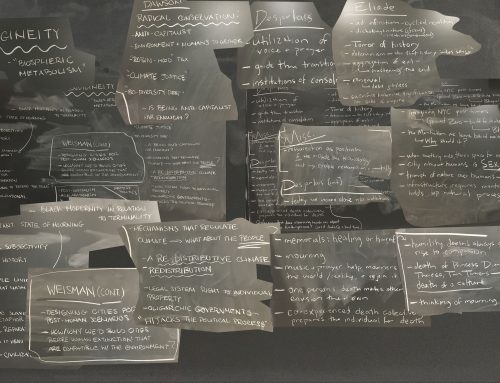11/6/18
Charlie Magun
Sintra Martins
Milagros Hadad
Daryl Pazer (Absent)
Our beginning questions that we would like to ask Leonardo Figueroa Helland:
- Have there been any efforts (specifically in New York) to reform agriculture with indigenous knowledge or practices?
- Is Helland optimistic? What are his takeaways from his research?
- Could the United States incentivize more sustainable and more biodiverse agricultural production?
- How can we de-stigmatize the idea of communal living/indigenous living? Is our culture of consumption compatible with this sustainable culture of the “monoculture”?
Our question that we wound up asking Helland was whether any forms of indigenous knowledge have been utilized to revolutionize or reform agricultural production in the United States. Helland noted that the United States government, and state governments, have not seriously considered or applied indigenous knowledge within the agriculture industry. While there are local initiatives, these groups face limitations in the form of lack of land access and lack of power. The specific groups, organizations, and initiatives that Helland mentioned were the Alaska Native Knowledge Network, The Great Lakes Food Festival, The Indigenous Environmental Network, and the white allies that have undertaken their own projects in Colorado.
The Alaska Native Knowledge Network is an educational network that focuses on recovering indigenous knowledge, focusing on hunter/gatherer practices and agriculture (http://www.ankn.uaf.edu/ ). The Great Lakes Intertribal Food Summit focuses on sharing indigenous foods, food preparation, and tool making. (https://iacgreatlakes.com/events/great-lakes-intertribal-food-summit/summit/ ).
The Indigenous Environmental Network fights against pipeline expansion and uses direct action to protect the environment (http://www.ienearth.org/ ).
Helland also mentioned the work of Kyle Whyte who is a professor and runs the Indigenous Science Letter (https://sites.google.com/view/indigenous-science-letter ).
Despite the fact that local groups have revitalized forms of indigenous knowledge and continue to fight for the rights of indigenous populations, there is a constant struggle to receive power and sovereignty from American Government. Only time will tell if the United States will ever employ more sustainable forms of agriculture that are currently practiced within Indigenous populations or whether it will be up to individuals and groups to continue the fight for eternity.
Professor Helland also illustrated the tensions between the Global South and The North. The emerging economies of the South are almost forced to conform and emulate to the economic policies of the North in order to have some relevance in the global economy which, as a result of this, is becoming hegemonic. In the period after colonization, the south was heavily influenced by Eurocentric beliefs, sacrificing their own systems to become “modernized” and “improve” their living condition. Structurally violent practices were used through the “rise” of the North, and this included appropriating land and even humans and using them only as resources. This highly structured inequality requires a critique of neoliberal capitalist system of the modern world.

Recent Comments